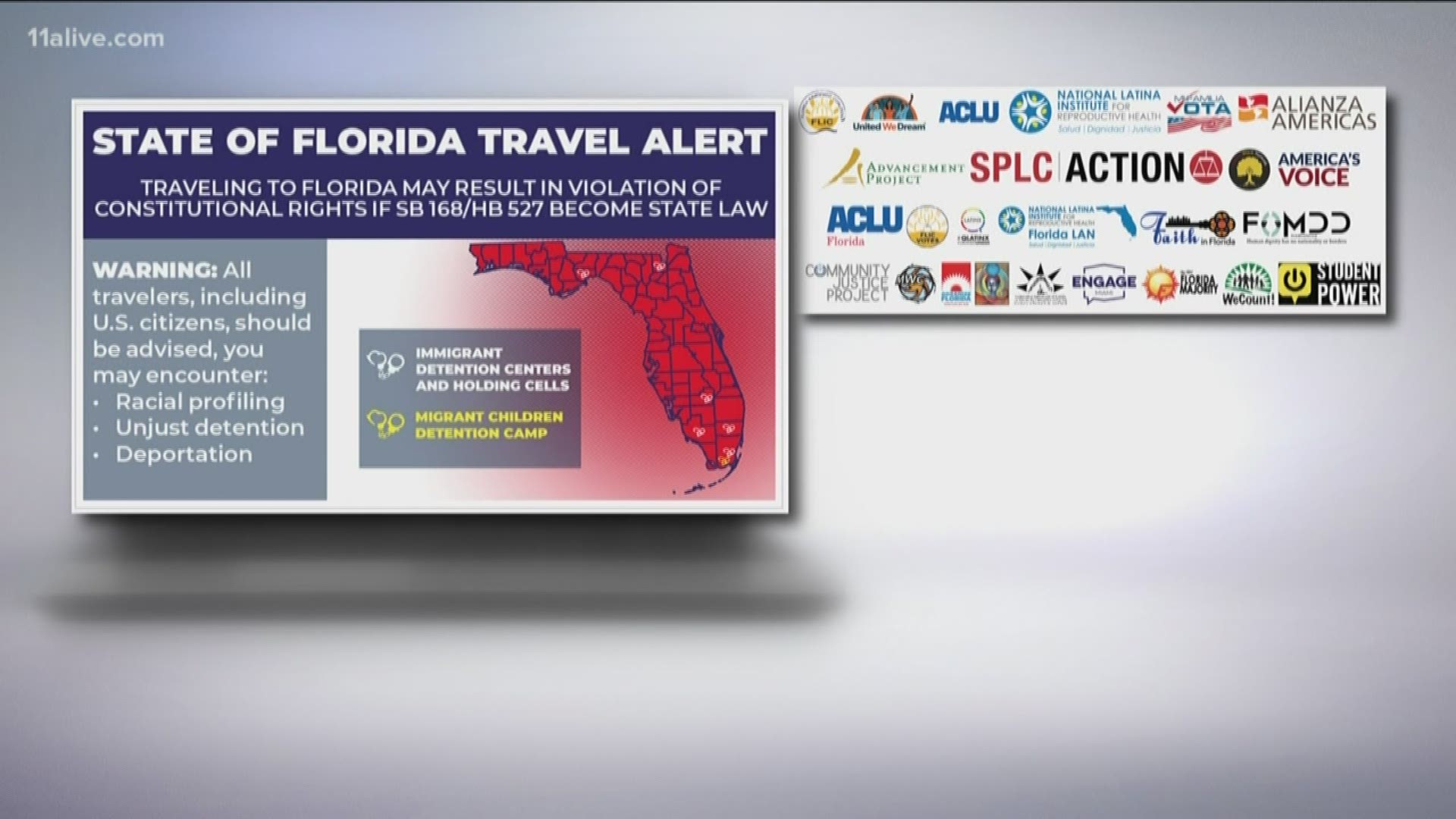ATLANTA — The American Civil Liberties Union (ACLU) and a coalition of immigration and civil rights groups are cautioning immigrants and people of color against traveling to Florida. The ACLU issued the warning from the national non-profit's Twitter account on Monday.
This comes as Florida lawmakers consider two anti-sanctuary bills. House Bill 527 and Senate Bill 168 would force local law enforcement in Florida to cooperate with federal immigration officials.
State Senator Joe Gruters introduced SB 168. Gruters is also chairman of the Republican Party of Florida.
"This bill is all about the rule of law and making sure that we have local elected officials doing the right thing," Gruters told 11Alive when asked about SB 168. "Right now, there is no definition of what a sanctuary jurisdiction is in the state of Florida, so what this is, is it defines it and it prevents local government officials from prohibiting cooperation with federal immigration laws and rules."
If passed, SB 168 wouldn't allow for "sanctuary" policies in Florida and would force local law enforcement to comply with the following:
- Active immigration detainers for an individual
- Federal requests to be notified before the release of an inmate or detainee.
- Requests for federal immigration agency to have access to an inmate for an interview.
- Federal requests for information about a inmate's incarceration status or release date.
"We have 67 counties in Florida," Gruters said. "Twenty-nine have basic operating agreements in place now. This would basically require all 67 counties to come into an agreement. This is only dealing with criminal illegal aliens."
Gruters said the bill wouldn't require local governments to provide federal immigration officials with information about immigrants who contact police as witnesses or victims of a crime.
"If you’re a hard-working illegal out there working to try and make ends meet, if you’re a family doing the right thing, you have no worry about being deported," Gruters said when asked about SB 168. "This only deals with people that are criminal illegal aliens, who are committing crimes and there is a detainer request outstanding on them."
ACLU leaders though remain skeptical and believe the bill would undermine local governments "ability to protect the civil rights of their residents by forcing local officials to cooperate with ICE. It would also put immigrants at risk of violence, potentially forcing victims and witnesses to stay silent for fear of deportation," the organization's Florida chapter wrote in a statement.
In a travel warning published on its website, the Florida Immigrant Coalition shared the same concerns:
"This would make it harder for our local authorities to solve crimes and keep our neighbors safe. The bills mandates records be kept on the immigration status of all arrested persons, possibly including victims and witnesses, even if any charges were dropped or they were found innocent. If either bill becomes law, it would devastate Florida's communities by increasing the likelihood of racial profiling."
The warning claims travelers, including U.S. citizens, could encounter racial profiling, unjust detention, and deportation if the proposal becomes law. Miami, West Palm Beach, Orlando, Jacksonville, and Tallahassee are listed as several high-risk areas.
MORE |
The travel warning is backed by a total of 24 organizations.
Gruters strongly disagrees with the warning.
"It is disappointing that they’re ratcheting up this rhetoric and fear-mongering and pushing out this misinformation because it isn’t fair to Florida and they’re completely misrepresenting reality," he said.
Arkansas lawmakers also considered a similar bill during its current legislative session.
The Associated Press reported the proposal would have banned sanctuary cities in Arkansas and cut off their state funding and prohibited cities from preventing local law enforcement from asking about someone's citizenship or immigration status.
The Senate-backed bill failed Monday in the Arkansas House during a committee vote, after Arkansas Republican Governor Asa Hutchinson said he wanted the legislation re-worked, to ensure there wasn't an opportunity for racial profiling.
Pew Trusts reports 9 states, including Georgia, Alabama, Mississippi, North Carolina, and Tennessee already have had anti-sanctuary laws.
In 2009 the Georgia General Assembly passed legislation making sanctuary cities illegal. WMAZ previously reported the national think-tank Center for Immigration Studies lists Clayton and DeKalb counties as sanctuary counties since 2014.
"The counties seem to get around it by being counties and not being cities because the law technically is formed for cities, not for counties," Mercer University Professor Chris Grant told WMAZ.
Georgia Lawmakers went a step further in 2016, passing a bill requiring local governments to show they're complying with anti-sanctuary policies.
In Florida, Sen. Gruters said his anti-sanctuary bill is seeing progress with Republican Florida Governor Ron DeSantis in office who campaigned to stop sanctuary cities.
"This has stalled for the last 6 years in the legislature and this is the first year we’ve gotten it out of the Senate committee," Gruters said. "Now we are down with two (committees), we have one more to go. I expect we have the votes from here on out to make sure this becomes law."
The bill would need to pass full-floor votes in both chambers of the Florida legislature. The legislative session ends on May 3.
Gruters added while he believes immigration reform is needed on the national level, he is focused on making sure Florida is following current federal immigration laws.
"This is just about doing the right thing for Floridians and making sure we follow the rule of law that exists," Gruters said.
He said citizens with immigration-related concerns should petition their elected officials in Washington, D.C.

